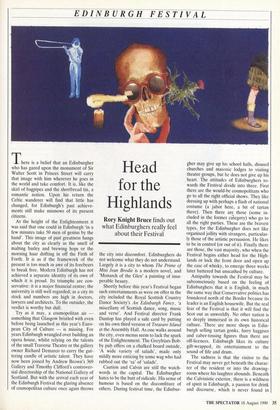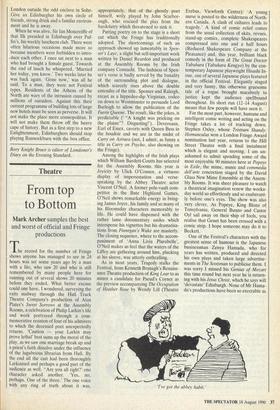EDINBURGH FESTIVAL
Head for the Highlands
Rory Knight Bruce finds out what Edinburghers really feel about their Festival There is a belief that an Edinburgher who has gazed upon the monument of Sir
Walter Scott in Princes Street will carry that image with him wherever he goes in the world and take comfort. It is, like the skirl of bagpipes and the shortbread tin, a romantic notion. Upon his return the Celtic wanderer will find that little has changed, for Edinburgh's past achieve- ments still make minnows of its present citizens.
At the height of the Enlightenment it was said that one could in Edinburgh 'in a few minutes take 50 men of genius by the hand'. This image of past greatness hangs about the city as clearly as the smell of malting barley and brewing hops or the morning haar drifting in off the Firth of Forth. It is as if the framework of the present is too much in awe of its forebears to break free. Modern Edinburgh has not achieved a separate identity of its own of which it is proud. Its triumphs are con- servative: it is a major financial centre; the university is still well regarded; as a city its stock and numbers are high in doctors, lawyers and architects. To the outsider, the verdict is worthy but dull.
Try as it may, a cosmopolitan air — something that Glasgow bristled with even before being launched as this year's Euro- pean City of Culture — is missing. For years Edinburgh wrangled over building an opera house, whilst relying on the talents of the small Traverse Theatre or the gallery owner Richard Demarco to carry the gut- tering candle of artistic talent. They have now been joined by Andrew Brown's 369 Gallery and Timothy Clifford's controver- sial directorship of the National Gallery of Scotland. But with the arrival each year of the Edinburgh Festival the glaring absence of cosmopolitan culture once again throws
the city into discomfort. Edinburghers do not welcome what they do not understand. Largely it is a city to whom The Prime of Miss Jean Brodie is a modern novel, and 'Monarch of the Glen' a painting of insu- perable beauty.
Shortly before this year's Festival began such entertainments as were on offer in the city included the Royal Scottish Country Dance Society's An Edinburgh Fancy, 'a miscellany of Scottish dance, song, music and verse'. And Festival director Frank Dunlop has played a safe card by putting on his own third version of Treasure Island at the Assembly Hall. As one walks around the city, even menus seem to lack the spark of the Enlightenment. The Greyfriars Bob- by pub offers on a chalked board outside, 'A wide variety of salads', made only mildly more enticing by some wag who had rubbed out the `sa' of 'salads'.
Caution and Calvin are still the watch- words in the capital. The Edinburgher hates to be the butt of ridicule. His sense of humour is based on the discomfiture of others. During festival time, the Edinbur-
gher may give up his school halls, disused churches and masonic lodges to visiting theatre groups, but he does not give up his heart. The attitudes of Edinburghers to- wards the Festival divide into three. First there are the would-be cosmopolitans who go to all the right official shows. They like dressing up with perhaps a flash of national costume (a jabot here, a bit of tartan there). Then there are those (some in- cluded in the former category) who go to all the right parties. These are the bravest types, for the Edinburgher does not like organised jollity with strangers, particular- ly those of the artistic persuasion. He likes to be in control (or out of it). Finally there are those, the vast majority, who when the Festival begins either head for the High- lands or lock the front door and open up the case of whisky, to emerge three weeks later battered but unscathed by culture.
Antipathy towards the Festival may. be subconsciously based on the feeling of Edinburghers that it is English, in much the same way that Conservative politics has foundered north of the Border because its leader is an English housewife. But the real fear of the Festival is that it will find the Scot out as unworldly. No other nation is so deeply immersed in its own historical culture. There are more shops in Edin- burgh selling tartan gonks, furry haggises and caber-tossing figures than there are off-licences. Edinburgh likes its culture gift-wrapped, its entertainment to the sound of fife and drum.
The sadness• is that the visitor to the Festival may never get beneath the charac- ter of the resident or into the drawing- room where his laughter abounds. Beneath the Calvinistic exterior, there is a wildness of spirit in Edinburgh, a passion for drink and discourse, which is never found in London outside the odd enclave in Soho. Give an Edinburgher his own circle of friends, strong drink and a familar environ- ment and he is away.
When he was alive, Sir Ian Moncreiffe of that Ilk presided in Edinburgh over Puf- fin's, his weekly luncheon club. There were often hilarious occasions made more so because members were forbidden to intro- • duce each other. I once sat next to a man who had brought a female guest. Towards the end of lunch he whispered, 'Married her today, you know.' Two weeks later he was back again. 'Gone now,' was all he said, To a man, they were not Festival types. Residents of the Athens of the North are wary of the intrusion caused by millions of outsiders. Against this their current programme of building lots of large new hotels must be seen as perverse. It will not make the place more cosmopolitan. It will not make them throw off the heavy cape of history. But as a first step to a new Enlightenment, Edinburghers should stop playing Bannockburn with the box office.
Rory Knight Bruce is editor of Londoner's Diary on the Evening Standard.



























































 Previous page
Previous page